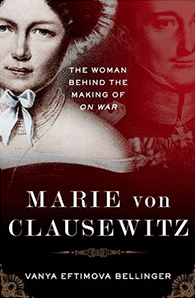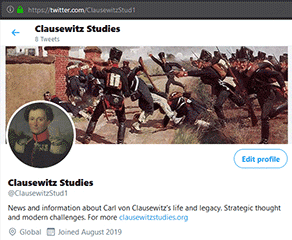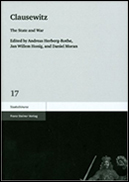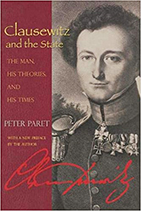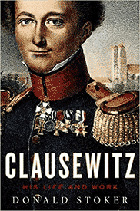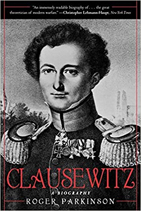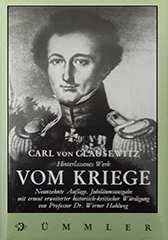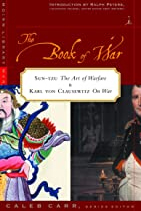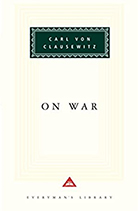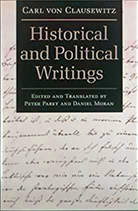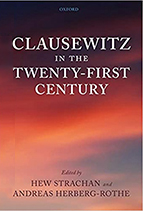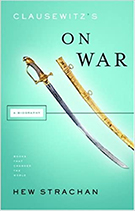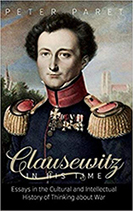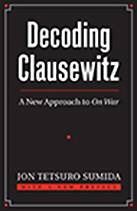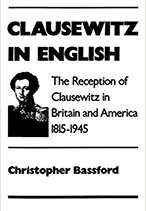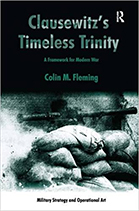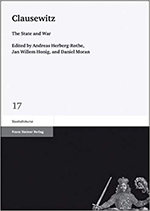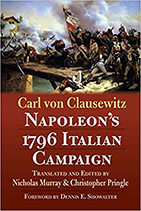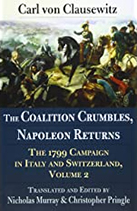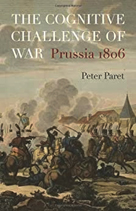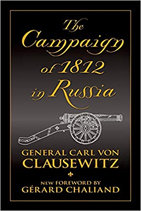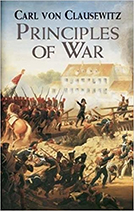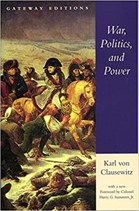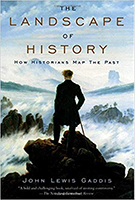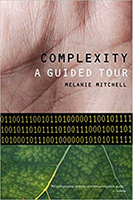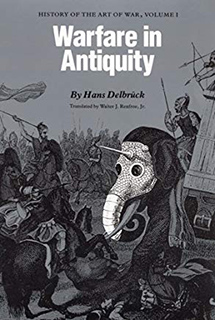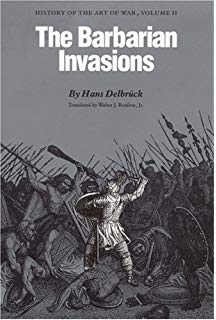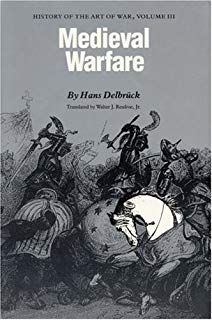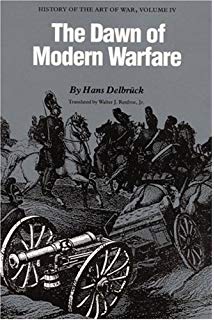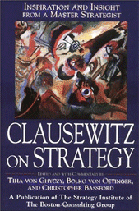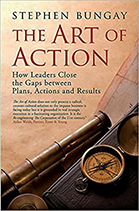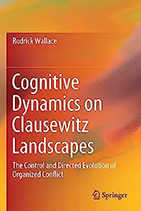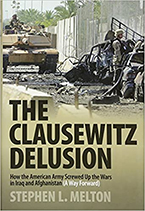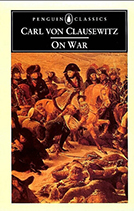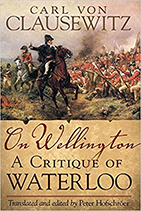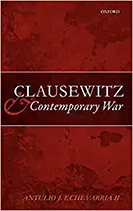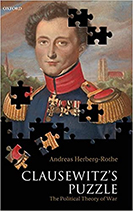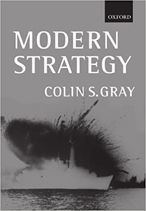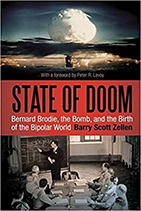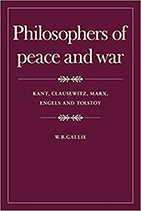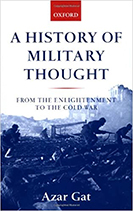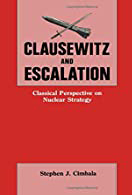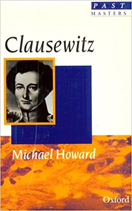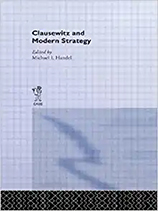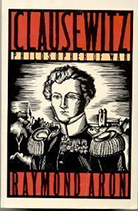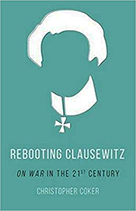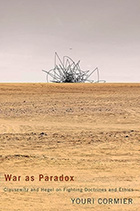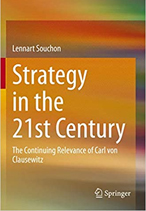 UNITED STATES
UNITED STATES

The Clausewitz Bookstore is a participant in the Amazon Services LLC Associates Program, an affiliate advertising program designed to provide a means for sites to earn advertising fees by advertising and linking to Amazon.com. We offer this service, not for profit (any proceeds go to defray the costs of maintaining this website) but as a convenient way for users to track relevant published materials. All transactions are strictly between the buyer and Amazon.com.
 If you are looking for older books in any language, collectibles, first editions, etc., try Marelibri.com, formed in 2007 by five independent European book listing services and marketplaces. Marelibri has since expanded to encompass independent book sites worldwide, growing its remarkable collection of rare and antiquarian books to over 80 million books.
If you are looking for older books in any language, collectibles, first editions, etc., try Marelibri.com, formed in 2007 by five independent European book listing services and marketplaces. Marelibri has since expanded to encompass independent book sites worldwide, growing its remarkable collection of rare and antiquarian books to over 80 million books.
NOTE: Amazon's book recommendations are undiscriminating and many available texts of Clausewitz's On War (Vom Kriege) are worthless—i.e., old, unreadable, and/or unidentified translations (often with anachronistic introductions and notes), incomplete, self-published knock-offs. For more detailed guidance on texts by or about Clausewitz, in several languages, see our bookstore listings above and this discussion of the available translations.
CONTENTS
Important Recent Works
Biographies
Key Works by or About Clausewitz
Clausewitz's Campaign Studies In English Translation
Three Books To Read Before You Read Clausewitz
(or before you read him again)
Works by or About Hans Delbrück
Non-Military-Focused Works on Clausewitz
Problematic Works
More Books
On Waterloo: Clausewitz, Wellington, and the Campaign of 1815, by Carl von Clausewitz and Arthur Wellesley, 1st Duke of Wellington
 WATERLOO BICENTENNIAL EDITION—2015
WATERLOO BICENTENNIAL EDITION—2015
Ed./trans. Christopher Bassford, Daniel Moran, and Gregory W. Pedlow.
Published 2010 by Clausewitz.com.
ISBN-10: 1453701508
ISBN-13: 9781453701508
Paperback, 318pp.
List price: $18.00.
Kindle edition US
This book is built around a new and complete translation of Clausewitz's study of the Waterloo campaign (Berlin: 1835), which is a strategic analysis of the entire campaign, not just the Battle of Waterloo. This is the first published English translation. Since this was one of Clausewitz's last such campaign studies (written c.1827), it reflects Clausewitz's most advanced thinking. However, because it was never incorporated into the unfinished manuscript of On War, most readers will find it to be new material. On Waterloo contains Wellington's initial battle report; two of Clausewitz's post-battle letters to his wife Marie; correspondence within Wellington's circle concerning Clausewitz's work; Clausewitz's 58-chapter campaign study; Wellington's controversial memorandum in response; and enlightening essays by the editors.
• MajGen/Dr. David T. Zabecki, The Journal of Military History, April 2011.
• Bruno Colson, "Clausewitz on Waterloo," War in History 19 (July 2012), pp.397-400.
Marie von Clausewitz: The Woman Behind the Making of On War, by Vanya Eftimova Bellinger (Oxford University Press, 2015), ISBN: 0190225432.
With the research skills of both a journalist and a serious scholar, Bellinger has done a spectacular job of tracking down sources where no one else had thought to look, in the process recovering some materials thought lost in World War II and others that were previously unknown. This is an important work in the field. Without the efforts of Countess Marie von Clausewitz, Carl von Clausewitz's crucial work on military theory and strategy—On War—would never have been published (or, quite possibly, written in the first place).
But as historian and Clausewitz scholar Vanya Eftimova Bellinger establishes in this ground-breaking biography of the "other" Clausewitz, Marie was far more than merely a supportive wife who facilitated her husband's legacy. Marie's 1810 marriage to Clausewitz did not make sense to many observers (least of all her mother). She was a wealthy, cultured, and politically engaged young woman from a famous family, one of the highest-ranking non-royals in Prussia. He was a junior Prussian army officer with no particular family or political connections. But the bond between Marie and Carl was forged by love, a deep sense of trust, and a meeting of minds over common political and intellectual interests. Newly discovered archival materials reveal the extent of Marie's influence on her husband, beginning with the very early days of the courtship and lasting until his premature death. The two came to a "collaborative opinion" on many topics, from the moral implications of war to the emotional constitution of true leadership. This biography sheds enormous light on two extraordinary lives and minds, offering the first comprehensive and compelling look at the woman behind the composition of On War. In the process, it gives us a much richer view of her husband's personal evolution and thus of the deeper meaning behind many of his concepts.
CLAUSEWITZ on TWITTER
https://twitter.com/ClausewitzStud1
Note: This link points to the "Wayback Machine" archive of Bellinger's blog dated 15AUG2022.
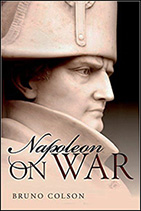 NAPOLEON: ON WAR (Oxford University Press, 2015). By Bruno Colson. 560pp. ISBNs: 0199685568, 978-0199685561.
NAPOLEON: ON WAR (Oxford University Press, 2015). By Bruno Colson. 560pp. ISBNs: 0199685568, 978-0199685561.
In exile on Saint-Helena, Napoleon mused about a great treatise on the art of war, but changed his mind and ordered the destruction of his notes. Thus was lost what would have been one of the most interesting and important books on the art of war ever written. The well known military historian Bruno Colson has spent years researching Napoleon's correspondence and other writings, including especially the copy-book of General Bertrand, the Emperor's most trusted companion on Saint-Helena. Colson's s ground-breaking work has been carefully organized to follow the framework of Carl von Clausewitz's classic On War, allowing a fascinating comparison between Napoleon's ideas and those of his great Prussian adversary and interpreter and highlighting the intriguing similarities between these two founders of modern strategic thought. Regardez l'edition Française.
 Colson's biography of Clausewitz is available, so far, only in French. See Peter Paret's very positive treatment in his extended review of it, "Clausewitz's Life and Work as a Subject of Historical Interpretation," in The Journal of Military History 81 (July 2017), pp.829–837.
Colson's biography of Clausewitz is available, so far, only in French. See Peter Paret's very positive treatment in his extended review of it, "Clausewitz's Life and Work as a Subject of Historical Interpretation," in The Journal of Military History 81 (July 2017), pp.829–837.
Also in French: Benoît Durieux, Clausewitz en France: Deux siècles de réflexion sur la guerre, 1807-2007 (Economica 2008), ISBN: 2717855777.
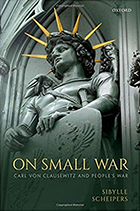 NEW! Sibylle Scheipers, On small war: Carl von Clausewitz and people's war (Oxford University Press, 2018), viii + 174pp., ISBN: 9780198799047.
NEW! Sibylle Scheipers, On small war: Carl von Clausewitz and people's war (Oxford University Press, 2018), viii + 174pp., ISBN: 9780198799047.
Clausewitz has long been interpreted as the paradigmatic thinker of major interstate war. This book challenges this assumption by showing that Clausewitz was an ardent analyst of small war and integrated many aspects of his early writings on partisan warfare and people's war into his magnum opus, On War. It reconstructs Clausewitz's intellectual development by placing it in the context of his engagement with the political and philosophical currents of his own times—German Idealism, Romanticism, and Humanism. Far from leaving behind his early advocacy of people's war, Clausewitz integrated it systematically into his mature theory of war. People's war was war in its existential form; it risked escalating into 'absolute war.' However, if the threat of defensive people's war had become a standard option of last resort in early-nineteenth century Europe, it could also function as a safeguard of the balance of power. Reviewed by James + W. Davis, Contemporary Political Theory (2018). https://doi.org/10.1057/s41296-018-0272-x
TWO BIG-PICTURE TREATMENTS
CLAUSEWITZ
The State and War
Edited by Andreas Herberg-Rothe,
Jan Willem Honig, and Daniel Moran
Stuttgart: Franz Steiner Verlag, 2011
ISBN 978-3-515-09912-7
Clausewitz Goes Global
Carl von Clausewitz in the 21st Century
Clausewitz Gesellschaft, Hamburg. Reiner Pommerin, ed. Berlin: Miles Verlag, 2011.
ISBN-10: 3937885412
ISBN-13 978-3937885414
Marie von Clausewitz: The Woman Behind the Making of On War, by Vanya Eftimova Bellinger (Oxford University Press, 2015), ISBN: 0190225432.This is an important work in the field. While its focus may be on Marie, this is without a doubt the best biography of Carl as well. It provides the social, political, intellectual and professional context within which he moved in a remarkably round manner. It also provides a much stronger factual and evidentiary basis for assessing Clausewitz's personal character, motivations, and constraints than we have ever had before. With the research skills of both a journalist and a serious military scholar, Bellinger (a European who speaks multiple languages) has done a spectacular job of tracking down sources where no one else had thought to look. In the process she has recovered many materials thought lost in World War II and brought up others that were previously unconsidered. Without the efforts of the well educated, well connected, and highly political Countess Marie von Brühl, Carl's crucial work on military theory and strategy—Vom Kriege—would never have been published (and, quite likely, never written). This biography sheds enormous light on two extraordinary lives and minds, offering the first comprehensive and compelling look at the woman behind the creation of Vom Kriege. In the process, it gives us a much richer view of her husband's personal evolution and thus of the deeper meaning behind many of his concepts.
Clausewitz and the State, 2nd edition, by Peter Paret (Princeton University Press, 2007). ISBN: 0691131309. The new edition of this classic 1976 work—at that time the best biography of Clausewitz available in English—includes a preface that allowed Paret to recount the past thirty years of discussion on Clausewitz and respond to critics. While the book has been critized for its somewhat arid focus on Clausewitz the intellectual. However, it also began the work of dismantling the ahistorical mythology surrounding Clauseitz's personality and character, which V.E. Bellinger has now greatly advanced. As a companion volume to Clausewitz's On War, it is indispensable to anyone interested in Clausewitz, his theories, and their proper historical context.
Clausewitz: His Life and Work, by Donald Stoker [Naval War College at the Naval Postgraduate School in Monterey]. New York: Oxford University Press, 2014, ISBN: 0199357943. Stoker notes that those discussing Clausewitz's legacy as a theorist today have largely forgotten what was most important to him: being a soldier. While Clausewitz certainly spilled his share of ink, he also spilled blood—his own and the enemy's. He experienced the mass warfare of his age and knew what it was like to to have friends killed and wounded, to be wounded, to see one's army destroyed, to be taken prisoner, to suffer hunger and thirst, to see troops dependent on him suffer, and to have the heat and cold try to kill him after the enemy's best efforts had failed. The pursuit of success on the field of battle, Stoker argues (somewhat losing track of Clausewitz's fervent desire to see his State succeed in the Great-Power competition) is what drove Clausewitz. He also considers the continuing relevance of Clausewitz's work today—a section that would have been stronger if he had delved more deeply into Clausewitz's mature theoretical foundation.
A quibble: In what is probably an effort to appear balanced, Stoker (who has never served in uniform) gets a bit carried away in his criticisms of Clausewitz's perfectly normal career ambitions and efforts to get ahead professionally. This reflects a long tradition of efforts to psychoanalyze Clausewitz based on little to no evidence.
Clausewitz: A Biography, by Roger Parkinson (New York: Stein and Day, 1971; reissued 2002). Softcover ISBN: 0815412339. This book is poorly regarded by many for its poor grasp of Clausewitz's theories and for some glaring historical errors. However, it does have some strengths in covering Clausewitz's personal life and battlefield military experiences. It has been superceded by Vanya Bellinger's outstanding biography of Marie von Clausewitz (Oxford University Press, 2015). Peter Paret's Clausewitz and the State, 2nd edition (Princeton University Press, 2007) also remains very relevant.
Note: There are three major English translations of Clausewitz's On War (and several rather more obscure ones). Most electronic versions are copies of the old 1873 Graham translation (because it is out of copyright), but unless you are focused on understanding the viewpoint of Victorian-era Britons, it is not the version you want. Also, check the ISBNs for the book you're ordering. Amazon's listings for On War are profoundly confusing—use our links to arrive at the version/edition/translation you're looking for.
Vom Kriege, by Carl von Clausewitz,
ed. Werner Hahlweg.
Gebundene Ausgabe - Dümmler, Bonn. Erscheinungsdatum: 1991, 19. Auflage,
Nachdruck.fl.
ISBN: 342782019X
This is the 19th German edition, published by Dümmlers, Clausewitz's original publisher. It was edited by the esteemed German scholar Werner Hahlweg and is considered the standard and most accurate edition. ClausewitzStudies.org also posts the full text of Vom Kriege on-line. A single-file version, useful for researchers but rather unwieldy, is posted HERE.
Buy the best translation—recommended for serious readers. The Book of War (The Modern Library, February 2000). ISBNs: 0375754776, 9780375754777. Clausewitz and Sun Tzu in one book. The translation of Clausewitz's On War is the 1943 version done by German literary scholar O.J. Matthijs Jolles at the University of Chicago during World War II—not today's standard translation, but certainly the most accurate. The only flagrant error we're aware of is the Germanic (but incorrect) spelling of Clausewitz's first name with a 'K'—almost certainly the publisher's decision, not the translator's. Overall, the main problem with the Jolles translation is that it was made during World War II and reflects anachronistic attitudes: Clausewitz's Prussia was not Nazi Germany. With an interesting introduction by contemporary military guru Ralph Peters. The version of Sun Tzu included is also excellent—this is the modern translation by Roger Ames, based on complete ancient texts found by archaeologists.
A complete (all 8 Books) posting of the 1873 J.J. Graham translation is provided free on-line HERE, freed of the anachronistic insertions of later editors (principally Maude and Rapoport). The Graham translation is quite accurate, but its English is typically Victorian.
On War, by Carl von Clausewitz, trans. Michael Howard and Peter Paret (Alfred A. Knopf, 1976/84). ISBN: 0679420436. This is the Everyman's Library edition, a very fine edition of the Howard/Paret translation. It is superior in some ways to the standard Princeton version, despite the H/P translation's fundamental weaknesses. However, the pagination is different, making it more difficult to locate specific quotations, etc. If you're serious about reading Clausewitz in detail, read the much more accurate translation by O.J. Mattjis Jolles. See this discussion of the various English translations of Clausewitz's Vom Kriege.
A complete (all 8 Books) posting of the 1873 J.J. Graham translation is provided free on-line HERE, freed of the anachronistic insertions of later editors (principally Maude and Rapoport). The Graham translation is quite accurate, but its English is typically Victorian.
Buy the standard English translation of Clausewitz's On War, by Michael Howard and Peter Paret (Princeton University Press, 1976/84). ISBN: 0691018545 (paperback). Kindle edition. This quite readable translation appeared at the close of the Vietnam War and has become the modern standard. However, if you're serious about reading Clausewitz in detail, read the much more accurate translation by O.J. Mattjis Jolles—See it listed above or to the far left of this column. Even the Jolles edition suffers, however, from anachronistic attitudes toward Prussia/Germany at the time of translation (1943). It may be too early to tell how much the Cold Wart/Vietnam context may have distorted H/P's presentation.
For background, see this discussion of the various English translations of Clausewitz's Vom Kriege.
A complete (all 8 Books) posting of the 1873 J.J. Graham translation is provided free on-line HERE, freed of the anachronistic insertions of later editors (principally Maude and Rapoport). The Graham translation is quite accurate, but its English is typically Victorian.
Historical and Political Writings, by Carl von Clausewitz, trans. Peter Paret and Daniel Moran (Princeton University Press, 1992). ISBN: 0691031924. This companion volume to On War brings together some of Clausewitz's political writings and a selection of his historical works. This material reveals Clausewitz as an exceptionally independent observer both of the past and of his own times, distinguished by an unideological pragmatism and a keen sense of the possibilities and shortcomings of state power. Contents.
Marie von Clausewitz: The Woman Behind the Making of On War, by Vanya Eftimova Bellinger (Oxford University Press, 2015). ISBN: 0190225432.This is an important work in the field. While its focus may be on Marie, this is without a doubt the best biography of Carl as well. It provides the social, political, intellectual and professional context within which he moved in a remarkably round manner. It also provides a much stronger factual and evidentiary basis for assessing Clausewitz's personal character, motivations, and constraints than we have ever had before. With the research skills of both a journalist and a serious military scholar, Bellinger (a European who speaks multiple languages) has done a spectacular job of tracking down sources where no one else had thought to look. In the process she has recovered many materials thought lost in World War II and brought up others that were previously unconsidered. Without the efforts of the well educated, well connected, and highly political Countess Marie von Brühl, Carl's crucial work on military theory and strategy—Vom Kriege—would never have been published (and, quite likely, never written). This biography sheds enormous light on two extraordinary lives and minds, offering the first comprehensive and compelling look at the woman behind the creation of Vom Kriege. In the process, it gives us a much richer view of her husband's personal evolution and thus of the deeper meaning behind many of his concepts.
On small war: Carl von Clausewitz and people's war, by Sibylle Scheipers (Oxford University Press, 2018), viii + 174pp., ISBN: 9780198799047. Clausewitz has long been interpreted exclusively as the paradigmatic thinker on major interstate war. In fact, Clausewitz was an ardent analyst of small war. Scheipers reconstructs Clausewitz's intellectual development in the context the political and philosophical currents of his own times—German Idealism, Romanticism, and Humanism—and shows how he systematically integrated people's war into his mature theories in Vom Kriege. Reviewed by James W. Davis, Contemporary Political Theory (2018). https://doi.org/10.1057/s41296-018-0272-x
Clausewitz in the Twenty-First Century, edited by Hew Strachan and Andreas Herberg-Rothe (Oxford University Press, September 2007). ISBN: 0199232024. This is the proceedings of the March 2005 Oxford University conference on Clausewitz in the 21st Century. This is a stellar, multidisciplinary collection of essays that defines the current state of the art in Clausewitz studies. Kindle edition.
See discussion by Andreas Herberg-Rothe and Tony Echevarri; 2007 Review by James Woudhuysen in Spiked.
Clausewitz's On War: A Biography, by Hew Strachan (Atlantic Monthly Press, 2006). ISBN: 0871139561. In this biography of the book On War (not of its author), Strachan, one of the world's foremost military historians, offers some answers to many of the problems posed by Clausewitz's writings. He explains how and why On War was written, elucidates what Clausewitz meant, offers insight into the impact it has had on conflict, and evaluates its continued significance in our world today.
Clausewitz in His Time: Essays in the Cultural and Intellectual History of Thinking About War, by Peter Paret (Berghahn, 2014). 134pp. ISBNs 1782385819, 978-1782385813. Clausewitz was far from being a detached theorist. He was as intensely aware of the cultural and intellectual currents of his time as he was engaged in its political and military conflicts. The society in which he lived and the people with whom he served affected both the analytical methods he developed and the conclusions he reached. The essays in this volume deepen our knowledge of Clausewitz's understanding of warfare, from its mechanisms to its apparently permanent place in interstate relations.
Decoding Clausewitz: A New Approach to On War, by Jon Tetsuro Sumida (University Press of Kansas, 2008). ISBN (hardcover): 9780700616169; (paperback 0700618198). Sumida contends that Clausewitz's central value lies in his method of reenacting the psychological difficulties of high command in order to promote the powers of intuition that he believed were essential to effective strategic decision-making. Sumida also correctly notes Clausewitz's argument that the defense is a stronger form of war than the offense and goes on to argue that this is in fact his primary strategic proposition. This concept, Sumida maintains, must be understood in order to make sense of Clausewitz's positions on absolute and real war, guerrilla warfare, and the relationship of war and policy/politics. Here is the Preface and Table of Contents.
Clausewitz and the State, 2nd edition, by Peter Paret (Princeton University Press, 2007). ISBN: 0691131309. The new edition of this classic 1976 work—the best biography of Clausewitz available in English—includes a preface that allows Paret to recount the past thirty years of discussion on Clausewitz and respond to critics. A companion volume to Clausewitz's On War, this book is indispensable to anyone interested in Clausewitz, his theories, and their proper historical context.
Clausewitz in English: The Reception of Clausewitz in Britain and America, 1815-1945, by Christopher Bassford (Oxford University Press, 1994). ISBN: 0195083830. Explores what soldiers, academics, and others in the English-speaking world were saying about Clausewitz between 1815 and the mid-1990s—and, more intriguingly, why. Not always a pretty tale. The full text is on-line free HERE.
"[A] startlingly worthwhile book.... Bassford tells a great story of dutiful struggle and pigheadedness, of petty revenge and epiphany, and, ultimately, of how Anglophone armies that read Clausewitz reluctantly beat the hell out of a German-speaking military that willfully read him wrong." (Ralph Peters)
Clausewitz's Timeless Trinity: A Framework for Modern War, by Colin M. Fleming [U. Ediburgh, UK]. Ashgate (Military Strategy and Operational Art), 2013. ISBN-10: 140944287X, ISBN-13: 978409442875. Innovatively applying the Clausewitzian Trinity of 'passion, chance, and reason' to the experience of real war, Fleming explores the depth and validity of the concept against the conflicts of former Yugoslavia—wars thought to epitomise a "post-Clausewitzian" age. In doing so it demonstrates the timeless message of the Trinity, but also ties the Trinitarian idea back into Clausewitz's political argument. Intended to build on the existing corpus of scholarship, this book differs from the existing literature in two ways. By applying the Trinity to the wars of former Yugoslavia 1991-1995, it explores war at its micro-foundations, assessing the complex cause-and-effect nexus of reciprocity produced by actions between belligerents embroiled in dynamic competition perpetuated by their own interaction.
War, Clausewitz and the Trinity, by Thomas Waldman. Ashgate, 2013. ISBN 9781409451396. Today, the ideas of Carl von Clausewitz (1780-1831) are employed almost ubiquitously in the strategic studies, military history and defence literatures. Often, however, the writers distort the concepts' true meaning. In this book, Waldman explores Clausewitz's central theoretical device for understanding war—the 'remarkable trinity' of politics, chance, and passion. By situating the great Prussian in his own historical context, he presents a conception much truer to Clausewitz's intention. Publisher's page: UK — US.
Clausewitz, The State and War. Editors Andreas Herberg-Rothe, Jan Willem Honig, and Daniel Moran. Stuttgart: Franz Steiner Verlag, 2011. ISBN 9783515099127. Clausewitz’s understanding of war was shaped by his understanding of the state, which he regarded as the central institution of modern life. His achievements as a theorist of war in turn clarify one of the state’s essential activities: the use of force to defend and advance its interests and values, and those of the society it governs. These diverse essays take Clausewitz’s ideas about the state as the starting point for analyzing the central issue posed by his work: the relationship between war in all its manifestations and politics in all its forms. The modern state was the starting point for Clausewitz’s understanding of politics, but did not unduly confine his outlook, nor cause him to suppose that only states make war. Similarly, while it is the wars of states that provided most of the historical evidence on which his theoretical work rests, the implications of that work can be seen to encompass political violence in all its forms.
and other books by Clausewitz available in English translation
Return to top
Napoleon's 1796 Italian Campaign, by Carl von Clausewitz, trans. Nicholas Murray and Christopher Pringle (University Press of Kansas, 2018). 352pp. ISBNs: 070062676X, 978-0700626762. Paperback (also available in hardcover). Among Clausewitz's historical works is this study of the Italian campaign of 1796, which marked a crucial period in the French Revolutionary Wars. The proper title should be The Campaign of 1796 in Italy (a direct translation of the German title, Der Feldzug von 1796 in Italien) and Clausewitz is concerned with all key decision-makers in the campaign, not just Napoleon. Constantly moving from politics to strategy to battle scene to analysis, this first English translation nimbly conveys the character of Clausewitz's writing in all its registers: the brisk, often powerful description of events as they unfolded; the critical reflections on strategic theory and its implications; and most bracing, the dissection and sharp judgment of the actions of the French and Austrian commanders. The translation itself is highly readable and straight-forward, though marred by some questionable editorial interventions and footnotes.
Napoleon Absent, Coalition Ascendant: The 1799 Campaign in Italy and Switzerland, Volume 1, by Carl von Clausewitz, trans. Nicholas Murray and Christopher Pringle (University Press of Kansas). 440pp. ISBNs 0700630252, 9780700630257. Paperback (also available in hardcover). Clausewitz (1780-1831) is best known for his masterpiece of military theory On War, yet that work formed only the first three of his ten-volume published writings. The others, historical analyses of the wars that roiled Europe from 1789 through 1815, informed and shaped Clausewitz's military thought, so they offer invaluable insight into his dialectical, often difficult theoretical masterwork. Among these historical works, one of the most important is vol. 5, Die Feldzüge von 1799 in Italien und der Schweiz, which covers an important phase of the French Revolutionary Wars. This is the first of two volumes of Napoleon Absent, Coalition Ascendant, which together will cover the period when Napoleon was absent from Europe during his invasion of Egypt. It focuses on the Second Coalition's campaign in Italy and the allies' victories under Suvorov's dynamic leadership that carried the tide of battle up against the French frontier. Moving from strategy to battle scene to analysis, the first English translation of this material nimbly conveys the character of Clausewitz's writing in all its registers: the brisk, often powerful description of events as they unfolded and the critical reflections on strategic theory and its implications. Napoleon Absent, Coalition Ascendant includes the major battles of Trebbia and Novi and will expand readers' experience and understanding of not only this critical moment in European history but also the thought and writings of the modern master of military philosophy.
Carl von Clausewitz, trans. Nicholas Murray and Christopher Pringle, The Coalition Crumbles, Napoleon Returns: The 1799 Campaign in Italy and Switzerland, Volume 2 (University Press of Kansas). 344pp. ISBNs 0700630341, 978-0700630349. Paperback (also available in hardcover). Clausewitz (1780–1831) is best known for his masterpiece of military theory, On War, yet that work formed only the first three of his ten-volume published writings. The others, historical analyses of many wars that roiled Europe in various periods, especially during the age of the French Revolution and Napoleon, informed and shaped Clausewitz’s military thought, so they offer invaluable insight into his dialectical, often difficult theoretical masterwork. These historical works include Der Feldzug von 1799 in Italien und der Schweiz. Volume 2 focuses mainly on the campaigns in Switzerland, where cracks that finally fractured the alliance between Russia and Austria, leading to the defeat of the Second Coalition, first opened. Moving from strategy to battle scene to analysis, this first English translation of volume 6 of Clausewitz’s collected works nimbly conveys the character of Clausewitz’s writing in all its registers: the brisk, often powerful description of events as they unfolded and the critical reflections on strategic theory and its implications. The Coalition Crumbles, Napoleon Returns features Suvorov’s astonishing march through the St. Gotthard Pass and major actions such as the Second Battle of Zurich and the Battle of Mannheim. This campaign study highlighted the contrast between the opposing armies’ strengths and weaknesses and the problems of coalition warfare. This book will expand readers’ experience and understanding not only of this moment in European history but also of Clausewitz's broader evolution and thinking.
The Cognitive Challenge of War: Prussia, 1806, by Peter Paret. Princeton University Press, 2009. ISBNs: 069118335X; 978-0691183350. Clausewitz's study of the campaign of 1806, Observations on Prussia in Her Great Catastrophe of 1806, was politically so explosive that it could not be published in Germany until 1888. Oddly, there is no complete English translation. We have a 1922 U.S. Army collection of "Notes on the Jena Campaign" that covers parts of it, and Paret and Daniel Moran published the first 3 chapters in their collection of Clausewitz's historical and political writing. In this book, Paret's discussion traces Napoleon's victory over Prussia in 1806 and Prussia's effort to recover from defeat to show how in one particular historical episode operational analyses together with institutional and political decisions eventually turned defeat to victory. In the concluding chapter, Paret addresses the impact of 1806 on two men who fought on opposing sides in the campaign and sought a new theoretical understanding of war—Henri Jomini and Carl von Clausewitz. Reviewed by Jennie Kiesling [USMA].
The Campaign of 1812 in Russia, by Carl von Clausewitz, trans. anonymous [Francis Egerton, Lord Ellesmere]. London: J. Murray, 1843. This particular reprint publication (one of many), with a Foreword by Gerard Chaliand, is from Blue Crane Books and dated 1996/2019. Softcover, 148pp. ISBN: 0962871583. The same text is free on-line Here. A better modern translation, partial and available only in print but with much better background information, can be found in Clausewitz, Historical and Political Writings, eds./trans. Peter Paret and Daniel Moran (Princeton: Princeton University Press, 1992), pp.110-205.
On Waterloo: Clausewitz, Wellington, and the Campaign of 1815, eds./trans. Christopher Bassford, Daniel Moran, and Gregory W. Pedlow (Clausewitz.com, 2010). ISBN: 1453701508. This book is built around a new and complete translation of Clausewitz's study of the Waterloo campaign [Berlin: 1835], which is a strategic analysis of the entire campaign (not just the Battle of Waterloo), and the Duke of Wellington's detailed 1842 response to it. It contains Wellington's initial battle report; two of Clausewitz's post-battle letters to his wife Marie; correspondence within Wellington's circle concerning Clausewitz's work; Clausewitz's full campaign study; Wellington's long memorandum; and enlightening essays by the editors. This was one of Clausewitz's latest campaign studies and its findings were never incorporated into On War. Thus most readers will find it new material. See reviews: MajGen/Dr. David T. Zabecki, The Journal of Military History, April 2011; Bruno Colson, "Clausewitz on Waterloo," War in History 19 (July 2012), pp.397-400.
Carl von Clausewitz, Principles of War. This is a reprint of Hans Gatske's 1942 translation of Die wichtigsten Grundsätze des Kriegführens zur Ergänzung meines Unterrichts bei Sr. Königlichen Hoheit dem Kronprinzen. It was composed for Clausewitz's 16-year-old royal student, the future King Friedrich Wilhelm IV of Prussia, just before the 1812 Russian campaign. Dover Books. ISBN: 0486427994. The full Gatske text is available free on-line HERE. The 1873 J.J. Graham translation is also free on-line HERE. Whichever version you read, Remember that Principles of War (1812) is NOT a 'summary' of On War (1832) but a distant and quite different precursor.
War, Politics, and Power. Selections from On War, and "I Believe and Profess" by Carl von Clausewitz, translated and edited by Edward M. Collins [COL, USAF] (Chicago: Henry Regnery Company, 1962). Softcover, 209pp. ISBN: 0895264013. This is a Cold War treatment that includes a translation of Clausewitz's famous “Bekenntnisdenkschrift,” or memorandum of confession. Writing in 1812 he insisted on “a Spanish war in Germany” (referring to the popular insurgency in Spain, which killed more French soldiers than were lost in Napoleon's invasion of Russia). Clausewitz outlined a comprehensive guerrilla strategy against Napoleonic France and supported his view with theoretical reflections about the nature of defence and offence.
Historical and Political Writings, by Carl von Clausewitz, trans. Peter Paret and Daniel Moran (Princeton University Press, 1992). ISBN: 0691031924. This companion volume to On War brings together some of Clausewitz's political writings and a selection of his historical works. This material reveals Clausewitz as an exceptionally independent observer both of the past and of his own times, distinguished by an un-ideological pragmatism and a keen sense of the possibilities and shortcomings of state power. Contents.
Scholars too often huddle trapped in their separate academic silos. Understanding the highly interdisciplinary scientific concepts discussed in these three books will profoundly reshape your internal model of "how the world works." And once your internal model has adjusted in this particular way, we guarantee you'll see Clausewitz in a strikingly different light. So shake off your career-path blinders long enough to read at least one of them. (Then read the other two, preferably in the order presented here.)
Chaos: Making a New Science, by James Gleick (New York: Viking, 1987/2008). ISBN: 0143113453. In the 20th-anniversary edition of this now-classic work, Gleick, formerly a science writer for the New York Times, depicts the beginnings of Chaos theory, which draws on the seemingly random patterns that characterize many natural phenomena. It explains the thought processes and investigative techniques of Chaos scientists, illustrating concepts like Julia sets, the Mandelbrot Set, and Edward Lorenz's "strange attractors, with sketches, photographs, and wonderfully descriptive prose. This highly readable international best-seller, published in virtually every important language on the planet, is must-reading for any Clausewitzian. (And anyone else with half a wit.) See this essay by Alan D. Beyerchen to understand the connection to Clausewitz.
The Landscape of History: How Historians Map the Past, by John Lewis Gaddis (New York: Oxford University Press, 2004). ISBN: 0195171578. What is History? What is Science? Is history a science? What kind of a science? Gaddis, perhaps the most prominent American historian of the Cold War, often called the "dean of American diplomatic history," answers these and other questions in this short, witty, searching look at the historian's craft. Historians combine the techniques of artists, geologists, paleontologists, and evolutionary biologists, paralleling in intriguing ways the "new sciences" of chaos and complexity. But the social scientists do not (according to Gaddis, at least). Their pursuit of independent variables functioning within static systems is divorced from the real world as we know it. Historians will be surprised to discover that they are very modern scientists. Social scientists will discover that science isn't what they thought it was. :-)
Complexity: A Guided Tour, by Melanie Mitchell (New York: Oxford University Press, 2009). This is the best, most readable and up-to-date treatment of Complexity that we're aware of. See image and Amazon link at right. Mitchell is Davis Professor at the Santa Fe Institute and Professor of Computer Science at Portland State University. This book won the 2010 Phi Beta Kappa Science Book Award, was named by Amazon.com as one of the ten best science books of 2009, and was long listed for the Royal Society's 2010 book prize. Her newest book is Artificial Intelligence: A Guide for Thinking Humans.
See also the above book's classic predecessor, Mitchell M. Waldrop, Complexity: The Emerging Science At The Edge Of Order And Chaos (Simon & Schuster, 1992). Waldrop tells us the historical development of the birthing ground of Complexity science, the Santa Fe Institute.
ABOVE: Hans Delbrück (1848-1929), History of the Art of War within the Framework of Political History, 4 vols., trans. [Brigadier General, USA] Walter J. Renfroe, Jr. (Westport, CT: Greenwood Press, 1975-85); to right, below: Arden Bucholz, ed., Delbrück's Modern Military History (University of Nebraska Press, 1997).
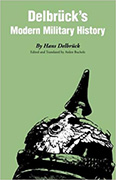 The German military historian Hans Delbrück wrote: "In a report that [Clausewitz] wrote on 10 July 1827 and that is placed at the head of the work he left behind, Vom Kriege, he considers redoing this work once more from the viewpoint that there is a double art of war, that is, the one 'in which the purpose is the overthrow of the enemy,' and the one 'in which one only intends to make a few conquests on the borders of the country.' The 'completely different nature' of these two efforts must always be separated from one another. Clausewitz died in 1831, before he could carry out this work. To fill out the lacuna that he left has been one of the purposes of the present work." (Delbrück, vol.4, p.454.)
The German military historian Hans Delbrück wrote: "In a report that [Clausewitz] wrote on 10 July 1827 and that is placed at the head of the work he left behind, Vom Kriege, he considers redoing this work once more from the viewpoint that there is a double art of war, that is, the one 'in which the purpose is the overthrow of the enemy,' and the one 'in which one only intends to make a few conquests on the borders of the country.' The 'completely different nature' of these two efforts must always be separated from one another. Clausewitz died in 1831, before he could carry out this work. To fill out the lacuna that he left has been one of the purposes of the present work." (Delbrück, vol.4, p.454.)
Delbrück is not widely read in English, but John Keegan thought highly of him and acknowledged him as "the father of modern 'scientific' military history." Unfortunately for the Clausewitz-hating Keegan, Delbrück himself was an ardent Clausewitzian. This fact seems to have posed no contradiction for Keegan, who was evidently unable to recognize either the meaning or the source of the theories Delbrück spent so much effort to explore.
Edited by Tiha von Ghyczy, Bolko von Oetinger, and Christopher Bassford. From the Boston Consulting Group's Strategy Institute. Publisher: John Wiley & Sons. ISBN: 0471415138.
• Hear audio ad (.mp3) •
BUSINESS: The Art of Action: How Leaders Close the Gaps Between Plans, Actions and Results, by Stephen Bungay (Nicholas Brealey Publishing, 2011). ISBN-10: 1857885597 ISBN-13: 978-1857885590. We hear increasingly that "strategy" is irrelevant and that all we really need is better execution. We're pretty sympathetic to the frustrations underlying that view, but the author of The Art of Action understands that strategy and execution are not separate domains. Stephen Bungay, who enjoys real credibility as a businessman (including 17 years with The Boston Consulting Group) and as a military historian (graduate work at Oxford and Tübingen) demonstrates a sophisticated grasp both of Clausewitz and Moltke's thinking and of how that thinking was reflected in practice by the German General Staff. Crucially, and unusually for writers who attempt to map the military domain to business, he genuinely understands that "business does not map, metaphorically, to war."
Carl von Clausewitz, the Fog-of-War, and the AI Revolution: The Real World Is Not A Game of Go, by Rodrick Wallace (Springer, 2018). ISBN: 3319746324. The language of business is the language of dreams, but the language of war is the language of nightmare made real. Yet business dreams of driverless cars on intelligent roads, and of other real-time critical systems under the control of algorithmic entities, have much of war about them. Such systems, including military institutions at the tactical, operational and strategic scales, act on rapidly-shifting roadway topologies whose ‘traffic rules’ can rapidly change. War is never without both casualties and collateral damage, and real-time critical systems of any nature will inevitably partake of fog-of-war and frictional challenges almost exactly similar to those that have made warfare intractable for modern states. Into the world of Carl von Clausewitz, John Boyd, Mao Tse-Tung, Vo Nguyen Giap, and Genghis Khan, come the brash, bright-eyed techies of Alphabet, Microsoft, Amazon, and Uber who forthrightly step in where a phalanx of angels has not feared to tread—but has tread very badly indeed. This book applies use cutting-edge tools from information and control theories to examine canonical and idiosyncratic failure modes of real-time cognitive systems facing fog-of-war and frictional constraints. In sum, nobody can ever navigate unscathed the landscapes described by Clausewitz.
Cognitive Dynamics on Clausewitz Landscapes: The Control and Directed Evolution of Organized Conflict, by Rodrick Wallace (Springer, 2020). ISBN: 3030264262. This book applies cutting-edge methods from cognitive and evolutionary theories to develop models of conflict between hierarchically-structured cognitive entities under circumstances of imprecision, uncertainty and stress. These were characterized as friction and the fog of war by the Prussian military theorist Carl von Clausewitz. Such conditions impair institutional cognition in real-time conflict and pose a real and continuing threat to organizations such as the US military. In a linked collection of formal essays and a mathematical appendix, the book explores different aspects of cognitive and evolutionary process as conducted under the direction of doctrine, which acts as a kind of genome for retention of what is learned through Lamarckian evolutionary selection pressures: that is, armies and corporate entities learn from conflict and incorporate that learning into their ongoing procedures. A central feature of the book is a formal description of the famous OODA loop of the US military theorist John Boyd in terms of the Data Rate Theorem that links control and information theories. A scientifically sophisticated exercise in applied mathematics, history, evolutionary theory, and ecosystem theory, this book is appropriate for researchers and students interested in defense, security, and international relations, as well for as non-academic career professionals in government and industry.
The Clausewitz Delusion: How the American Army Screwed Up the Wars in Iraq and Afghanistan (A Way Forward), by Stephen L. Melton (Zenith Press, 2009), ISBN-10: 0760337136. It's hard to argue with Melton's basic argument, i.e., that the US Army screwed up the wars in Iraq and Afghanistan. Whether this should be blamed on the Army in particular, on DOD broadly, on a dysfunctional administration, on a system of government specifically designed by its founders to be bad at imperial adventures, on a feckless ruling class, or on the idiocy of the voting public is clearly open to debate. But Melton seems to know little about Clausewitz and is simply using the name to describe an unrealistic approach to warfare rooted in an extraordinarily simplistic understanding of political and military history. For that, Clausewitz bears no responsibility, and the Army's "Clausewitz Delusion" is actually a delusion about Clausewitz rooted in that larger political and historical blindness. So this may be a good book on the Army or the "American way of war," but it has little to do with either Clausewitz or his actual ideas.
Clausewitz Reconsidered, by H.P. Wilmott and Michael B. Barrett (Praeger, 2009). ISBN: 0313362866. This book would have been a lot better had the authors spent some time actually reading Clausewitz before buying wholesale into the fantasies of the "New Wars" scholars. The authors assess Clausewitz's theories, examining their viability at a time when asymmetric warfare and war conducted by and against nonstate actors is increasingly common and state control often ephemeral. The basis of the book's analysis is an examination of war over the four centuries since the Thirty Years' War, including the Cold War and subsequent conflicts. The authors start with the dubious assumption that war today is far more endemic and brutal than when Clausewitz tried to explain it—a surprisingly Eurocentric argument that reflects professional military historians' fixation on open-field warfare by uniformed armies, not historical reality. [As to the endemic quality of warfare over the ages, see also Steven Pinker's The Better Angels of Our Nature: Why Violence Has Declined (Viking Adult, 2011), ISBN-10 0670022950.] This volume explores the alleged paradox Wilmot describes and argues that, if anything, we can anticipate further uncontrolled violence—which may indeed be true, despite the ahistoricism of Wilmot's and Barrett's analysis. The authors' conclusion is that Clausewitz and On War have assumed a status akin to holy writ but are dated (which should come as no surprise with an 1832 book). Their aim in Clausewitz Reconsidered is to bring "the master's" theories up to date, providing the current generation with a new basis for thought and analysis. That's a worthwhile ambition that clearly needs more thought than this effort demonstrates.
NOT Recommended.
Here's why.
On War, Carl von Clausewitz, edited and brutally abridged by biologist, game-theory-dabbler, and accomplished amateur musician Anatol Rapoport. Paperback, 461pp. Publisher: Viking Penguin, 1968; based on the 1873 Graham translation; includes many elements of imperialist and social Darwinist F.N. Maude's 1908 editorializing. ISBN: 0140444270. This deep abridgement of On War, done during the late 1960s by an anti-state non-expert whose primary motivation was to attack the "neo-Clausewitzian" Henry S. Kissinger, is remarkably misleading. It was evidently the only version of On War ever examined by the Clausewitzaphobic historian John Keegan, who seems never to have made it past Rapoport's long, hostile (to Kissinger, not Clausewitz) introduction.
On Wellington: A Critique of Waterloo, by Carl von Clausewitz as translated by Peter Hofschröer (University of Oklahoma Press, 2010). ISBN: 0806141085. WARNING: This is a negative review of a book that is a direct competitor of a Clausewitz.com product, so apply your own judgement to its critique. On Wellington is a translation of Carl von Clausewitz's Der Feldzug von 1815 in Frankreich (Berlin, 1835). The translator, Peter Hofschröer, is a widely acknowledged expert on the Waterloo campaign; an excellent, if tendentious, writer; and a more than competent translator. His general ignorance about Clausewitz, however (which one reviewer refers to as "amateurism in Clausewitz studies"), proves problematic. He uses Clausewitz's campaign study (which focuses equally on all of the top commanders of the campaign) primarily to continue his own longstanding personal vendetta against Wellington. Unfortunately for that cause, Clausewitz did not share Hofschröer's blatant prejudices and his book is no more a critique of Wellington than it is of Napoleon and of Blücher (Clausewitz's own commander during the campaign). Ironically, given its artificial focus on Wellington, and unlike On Waterloo, it contains only Clausewitz's campaign study and denies Wellington a real voice. It includes neither Wellington's original after-action report nor his lengthy and detailed reply to Clausewitz, nor his correspondence discussing the issues. But feel free to buy both books and let us know what you think. See reviews of both books in The Journal of Military History and War in History.
Clausewitz and America: Strategic Thought and Practice from Vietnam to Iraq, by Stuart Kinross (Routledge, 2008) ISBN: 041556963X. While many reviewers seem to regard Kinross's book as long-overdue attack on Clausewitz, Kinross's actual views are more sophisticated than that view would imply. Clausewitz's ideas played a part in the process of military reform and the transition in US policy that took place after the Vietnam War. By the time of the 1991 Gulf War, American policy makers demonstrated that they understood the Clausewitzian notion of utilizing military force to fulfil a clear political objective. The US armed forces bridged the operational and strategic levels during that conflict in accordance with Clausewitz's conviction. With the end of the Cold War, and an increasing predilection for technological solutions, American policy makers and the military moved away from Clausewitz. It was only the events of 11 September 2001 that reminded Americans of his intrinsic value. However, while many aspects of the 'War on Terror' and the conflict in Iraq can be accommodated within the Clausewitzian paradigm, the lack of a clear policy for countering insurgency in Iraq suggests that the US may have returned full circle to the flawed strategic approach evident in Vietnam.
Clausewitz and Contemporary War, by Antulio J. Echevarria (Oxford University Press, 2007) ISBN: 0199231915. Tony Echevarria lays out Clausewitz's methodology and uses that as a basis for understanding his contributions. He addresses Clausewitz's theories concerning the nature of war, the relationship between war and politics, the major principles of strategy he examined, and their relationship to current debates over the nature of contemporary conflict. Kindle edition.
Clausewitz on Small Wars, by Carl von Clausewitz, eds. Christopher Daase and James W. Davis (Oxford University Press, 2015). 216pp. ISBNs 0198737130, 978-0198737131. The editors have assembled and translated Clausewitz's most important texts devoted to the analysis of asymmetric, unconventional, guerrilla, and small-unit warfare, including Clausewitz's lectures on small war given at the Prussian War Academy in 1810 and 1811. These demonstrate that asymmetric warfare cannot be termed pre- or post-Clausewitzian, as many contemporary scholars of war and military strategy ahistorically assert. Rather, Clausewitz himself emerges as an early theorist of insurgency and asymmetric warfare with insights that are relevant today.
CONTENTS:
1. Introduction
2. Lectures on Small War at
the War College, 1810–1811
3. Testimonial
(Bekenntnisdenkschrift)
4. On the Political Advantages and
Disadvantages of the Prussian
Institution of the Landwehr
5. The Arming of the People
(Volksbewaffnung)
Reviewed by: Sibylle Scheipers for Small Wars & Insurgencies (includes a reply by the editors); Artemis Photiadou for LSE Review of Books; Simon Tyler for E-International Relations.
Clausewitz's Puzzle: The Political Theory of War, by Andreas Herberg-Rothe (Oxford: Oxford University Press, 2007). ISBN: 0199202699. Herberg-Rothe argues that Clausewitz developed a wide-ranging political theory of war by reflecting on the success, the limitations, and the failure of Napoleon's method of waging war, a theory, which is still relevant in light of contemporary conflict. The book lays down the foundation of a general theory of war by concentrating on Clausewitz's historical analyses of war campaigns. Also available in Chinese: 副标题: 战争的政治理论 (Huaxia Publishing House, 2020). ISBN: 9787508099026, which is also available from Amazon.com.)
See reviews in English and German of the German edition. See the publication announcement from OUP. See listings in Amazon.UK, and in Oxford Scholarship OnLine.
Modern Strategy, by Colin Gray (Oxford, 1999). Hardcover. ISBN: 0198280300. Softcover ISBN: 0198782519. Gray was considered by many to be the foremost Clausewitzian writer on strategic affairs in the post-Cold War era.
State of Doom: Bernard Brodie, the Bomb, and the Birth of the Bipolar World, by Barry Scott Zellen (Continuum, 2011). ISBN: 1441124624. This book examines Bernard Brodie's strategic and philosophical response to the nuclear age, embedding his work within the classical theories of Carl von Clausewitz. At the time of publication, Zellen was a Researcher at the Naval Postgraduate School in Monterey, USA, where he is Research Director of the Arctic Security Project. The managing editor of Culture and Conflict Review and Strategic Insights journals, he has published several books, including On Thin Ice: The Inuit, the State and the Challenge of Arctic Sovereignty (Lexington Books, 2009) and Arctic Doom, Arctic Boom: The Geopolitics of Climate Change in the Arctic (Praeger, 2009).
Philosophers of Peace and War: Kant, Clausewitz, Marx, Engels and Tolstoy, by W. B. Gallie (Cambridge: Cambridge University Press, 1978). ISBN 052129651X; 978-0521296519. From the book announcement: "Intellectual eminence apart, what did Kant, Clausewitz, Marx and Engels, and Tolstoy have in common? Professor Gallie argues that they made contributions to 'international theory'—to the understanding of the character and causes of war and of the possibility of peace between nations—which were of unrivalled originality in their own times and remain of undiminished importance in ours. But these contributions have been either ignored or much misunderstood."
The Development of Military Thought: The Nineteenth Century, by Azar Gat (Oxford: The Clarendon Press, 1992). ISBN: 0198202466. This is a useful and important book, though Gat is uncommonly pompous even for an academic. He tends to be impressed by his own insights to a profound but sometimes laughable degree.
The Origins of Military Thought: From the Enlightenment to the Cold War, by Azar Gat (Oxford University Press, 2001). ISBN: 0199247625. Gat continues both to have some good ideas and to take all of his own ideas rather more seriously than either the nature of reality or the actual evidence can justify. His argument is that Clausewitz suddenly discovered, very late in his life, that war is an expression of politics. This discovery then drove Clausewitz to a nervous breakdown from which he never recovered. There is no actual evidence for this view, and a great deal of evidence against it, but it served for quite some time to thoroughly confuse the debate over the meaning and intent of Vom Kriege.
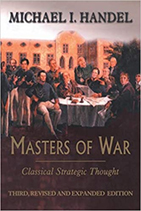
Masters of War: Classical Strategic Thought, by Michael Handel [US Naval War College] (Cass, 3rd ed, 2001). ISBN: 0714681326. Handel's work compares the thoughts of Sun Tzu, Jomini, and Clausewitz.
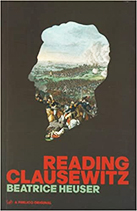
Reading Clausewitz, by Beatrice Heuser. (Pimlico, 2002). ISBN: 071266484X. Paperback - 320 pages This is a wide-ranging but rather shallow study—in the tradition of the "staff-college crammer"—on how to read Clausewitz and how others have read him, from the military commanders in World War One through Lenin and Mao Zedong to strategists in the nuclear age. Designed for Staff College students. See review.
Clausewitz and Escalation: Classical Perspectives on Nuclear Strategy, by Stephen Cimbala. (London: Frank Cass, 1991). Hardcover, 218pp. ISBN: 0714634204.
Michael Howard. Clausewitz. Oxford: Oxford University Press, 1983. Textbook Paperback, "Past Masters" series, 79th ed., 79pp. ISBN: 0192876074. Sir Michael Howard held the Chair of War Studies at King's College London, the Chichele Chair of History of War and the Regius Chair of Modern History at Oxford, and the Robert A. Lovett Chair of Military and Naval History at Yale. His works include The Franco-Prussian War, The Causes of Wars, War and the Liberal Conscience, The Lessons of History, and War in European History. Together with Peter Paret he edited and published an new translation of Clausewitz's On War in 1976.
Clausewitz and Modern Strategy, Michael I. Handel, ed. London: Frank Cass, 1986. 324pp. Hardcover, ISBN: 0714632945. Softcover 0714640530. This is a useful anthology that was very influential in the 1980s. Click here for a list of its contents.
Michael Howard, Clausewitz: A Very Short Introduction (Oxford University Press, 2002), ISBN: 0192802577. Sir Michael Howard held the Chair of War Studies at King's College London, the Chichele Chair of History of War and the Regius Chair of Modern History at Oxford, and the Robert A. Lovett Chair of Military and Naval History at Yale. His works include The Franco-Prussian War, The Causes of Wars, War and the Liberal Conscience, The Lessons of History, and War in European History. Together with his student Peter Paret he edited and translated Clausewitz, On War in 1976. This is a convenient introduction. However, it now reflects a rather dated and traditional—though very positive—view of Clausewitz.
Clausewitz: Philosopher of War, by Raymond Aron, trans. Christine Booker and Norman Stone (Simon & Schuster/Touchstone Books, 1985; Englewood Cliffs, N.J.: Prentice-Hall, 1985). 418pp. ISBNs: 0671628267, 9780671628260. Originally Penser la guerre, Clausewitz [Volume 1, L'âge européen, & Volume 2, L'âge planétaire (Paris: Editions Gallimard, 1976)]. Raymond Aron (1905–1983) was an extremely influential French sociologist, journalist, political scientist, and philosopher. This is a notoriously poor translation. Most reviewers advise readers to read the book in the original French—even if they can't read French.
Rebooting Clausewitz: On War in the 21st Century, by Christopher J. Coker (Oxford University Press, 2017). 272pp. ISBNs: 978-0190656539, 0190656530. From the review by R. Gerald Hughes and Alexandros Koutsoukis: "Should anybody doubt whether Clausewitz could tell us any more about small wars, they would be well advised to read Christopher Coker's thoughts on the matter in his new book. Coker, a professor at the London School of Economics, weighs into the debates on Clausewitz on all fronts.... [He] asserts that, despite his notoriety, the role of politics in Clausewitz’s world view has never been accorded due prominence.... He approached, then, what we, roughly speaking, would call the political ideology identified as ‘realism’ today. This interpretation of the issue might not be appealing for those of us who remain committed to using general moral principles to judge war regardless of place or time. But Clausewitz’s central insight about the role of politics in preventing the escalation of conflicts and putting limits to military action might still be very useful."
On Clausewitz: A Study of Military and Political Ideas, by Hugh Smith (Palgrave Macmillan, 2004). 272pp. ISBN-10: 1403935866, ISBN-13: 978-1403935861. Clausewitz is often quoted but more often misunderstood. On Clausewitz presents Smith's interpretation of his central ideas about war and politics—such as war as an instrument of policy, the concept of Absolute War, friction, and the fog of war—in a clear and systematic fashion. It also presents the man, his life, and the military and intellectual environment in which he produced his great work On War. The book tends to stress the limitations on Clausewitz's thought based on the era in which he worked. A final section considers Clausewitz's relevance to the rapidly changing character of war today.
See review by Barry Watts.
War as Paradox: Clausewitz and Hegel on Fighting Doctrines and Ethics, by Youri Cormier (McGill Queens University Press, 2016). ISBNs: 978-0773547698. Cormier lifts the fog on Clausewitz's iconic work by explaining its philosophical underpinnings. Building up a genealogy of dialectical war theory and integrating Hegel with Clausewitz as a co-founders of the method, Cormier uncovers a common logic that shaped the fighting doctrines and ethics of modern war. He explains how Hegel and Clausewitz converged on method, but nonetheless arrived at opposite ethics and military doctrines. Ultimately, Cormier seeks out the limits to dialectical war theory and explores the greater paradoxes the method reveals: can so-called “rational” theories of war hold up under the pressures of irrational propositions, such as lone-wolf attacks, the circular logic of a “war to end all wars,” or the apparent folly of mutually assured destruction? Since the Second World War, commentators have described war as obsolete. War as Paradox argues that dialectical war theory may be the key to understanding why, despite this, it continues.
Strategy in the 21st Century: The Continuing Relevance of Carl von Clausewitz, by Lennart Souchon (Cham, Switzerland: Springer, 2020). ISBNs: 3030460274 - 978-303046027. Lennart Souchon, a former naval officer, is a German strategist and scholar of political philosophy and military theory. He was the Director of the International Clausewitz-Center at the Military Academy of the German Armed Forces from 1999 to 2018 and founded the Clausewitz Network for Strategic Studies in 2008. He also served as Director of Studies at the German Federal Academy for Security Policy Study and is a senior member of the International Institute for Strategic Studies (IISS) in London. He is also an Honorary Professor at the University of Potsdam, Germany. His research focuses on strategic studies and on Clausewitz's strategic theory. This book presents a detailed discussion of Clausewitz's principal lines of thought and methods of implementation. It elaborates on his main objective of laying a foundation for the education of up-and-coming creative, knowledgeable and experienced future leaders and encourages reflection and study in strategic thinking in order to transform knowledge into genuine capability.
Clausewitzian "Trinity" demonstration device
The "Trinity" is a key concept in Clausewitzian theory, which Clausewitz illustrated by referring to this scientific device. You can obtain the ROMP (Randomly Oscillating Magnetic Pendulum) from science toy stores for about $30. (It's easy to remove the extra magnets shown here.)
Availability: This item is distributed (wholesale) by Supertek Scientific. You can buy it (retail) at Dabnis Scientific & Industrial. It is also listed on Amazon.com (USA), but is often unavailable there.
For other graphic visual metaphors for Clausewitz's Trinity, click here.
 French Bookstore
French Bookstore German Bookstore
German Bookstore UK Bookstore
UK Bookstore